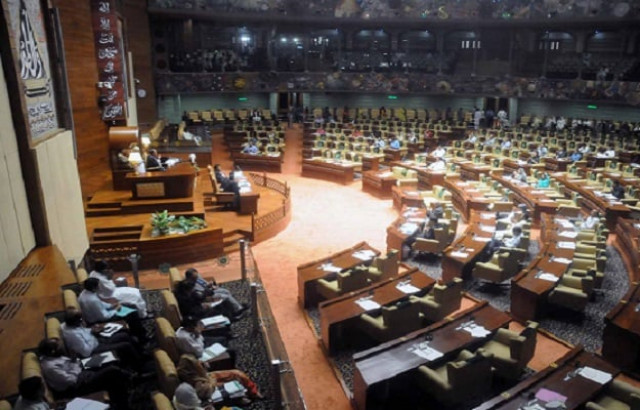Departmental spending exceeds budget
Despite a predicted fiscal deficit, state depts have shown little intent to curb expenditures

Despite a projected budget deficit exceeding Rs38 billion for the upcoming financial year, most Sindh government departments have shown little willingness towards effectively controlling expenditures.
Budget documents have revealed that several departments have overspent their allocated budgets during the current fiscal year, with additional expenses mostly attributed to non-productive categories such as fuel, operational costs, and allowances.
Among the major over spenders, the Sindh Assembly Secretariat used Rs871 million against an allocation of Rs760 million, with Rs371 million spent on fuel alone. The Chief Minister's House exceeded its budget of Rs1.32 billion by spending Rs1.63 billion. The Anti-Corruption Department went beyond its allocation of Rs1.65 billion and spent over Rs2 billion. Similarly, the Energy Department, allocated Rs62.4 billion, ended up spending Rs68.2 billion.
The Transport Department recorded the highest overspending. Against an allocation of Rs7.61 billion, it spent Rs11.03 billion, reportedly due to the procurement of new buses for Karachi. Similarly, the Education Works Department, responsible for construction and maintenance of school buildings, spent Rs10.21 billion, which is Rs2 billion more than its allocation of Rs8.2 billion. Likewise, the Board of Revenue also exceeded its allocation of Rs8.94 billion slightly, spending Rs9.10 billion. The Local Government Department overspent by Rs2 billion as well.
Critics have argued that most of these excesses are unnecessary and avoidable, primarily related to perks and fuel allowances. Tighter administrative controls and meaningful legislative debate could significantly reduce wasteful spending.
According to Dr Ikramul Haq, an economist, if the federal government provided Sindh with its full share under the National Finance Commission (NFC) award, Sindh government might not even need to incur additional expenditures. "This time as well, the federal government has given Rs250 billion less to Sindh, Provinces including Sindh prepare their budgets based on projected income for the coming year, which includes funds expected from the federal government. When the federal government does not provide provinces with their due share, the provinces are inevitably forced to make additional expenditures," explained Dr Haq.
It is worth noting that during the current fiscal year, which ends on June 30, Sindh's government departments incurred an additional expenditure of Rs156 billion. The Sindh government recently had this amount approved as a supplementary budget by the Sindh Assembly.
Among Deputy Commissioners (DCs), the most notable overspending was reported in Umerkot, Thatta, Qambar Shahdadkot, Mithi, Matiari, and Sanghar. For instance, DC Umerkot spent Rs140 million against a Rs116 million allocation, and DC Thatta spent Rs165 million against a Rs148 million budget.
According to a senior official from the Sindh Finance Department, many government institutions habitually overspend, and the Finance Department incorporates these figures into supplementary budgets, which are then approved by the Sindh Assembly, often without much scrutiny. "In the aftermath of the 18th Amendment, with a higher share from the National Finance Commission (NFC), provinces like Sindh have gained financial autonomy, reducing central oversight and enabling such expenditures with little resistance," said the official.
Journalist Muneer Saqi, who has long reported on Sindh Assembly proceedings, noted that, in principle, these additional expenditures should be debated in the Assembly. "In practice, however, the ruling party uses its majority to get them approved along with the annual budget, side-lining accountability," claimed Saqi. The problem of overspending, however, is not limited to provincial departments since divisional and district administrative offices are also reporting significant budget overruns.

























COMMENTS
Comments are moderated and generally will be posted if they are on-topic and not abusive.
For more information, please see our Comments FAQ